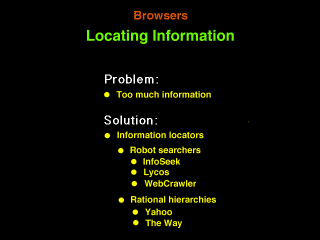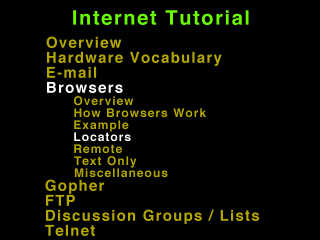 09-01
09-01


 09-00
09-00
This section illustrates the issue which will make or break the World Wide Web - Finding Information. Imagine a library with no Library of Congress organization and no catalog. As the books came in the just got stacked on the shelves.
The Web is much like that... information is out there in all sorts of places and cubby-holes. The trick is finding it.
The problem is too much information.
The solution: a plethora or search engines and indexes.
Searchers (line Lycos and Infoseek) periodically read web pages from sites all over the web and process the words on those web site. They build large databases of key words and the URL's to find those key words.
There are two parts to a searcher, the web interrogation and database building part and the database searching and URL locating part.
As a user you will be interested in the database searching functions.
One of the best search engines is the InfoSeek engine. They have both a free service and a "for fee" professional search service.
This example will go through the professional service.
When you select the professional service you will be challenged for your user name and password. Sorry, I won't tell you mine.
The query form allows you to specify multiple search keywords and to search various other databases as well of the web page database. Click on the "syntax and examples" hyperlink for hints on how to format your requests for more likely success.
Try to search for words that are likely to be unique for the subject you are searching for.
Here is a sample of the search results. Each entry has a hypertext link to the page found as well as a small amount of text from the page.
Rational hierarchies work differently... more like a library index. Information is sorted according to subject area. Often the decision as to where in the heirarchy a link belongs is left to the page creator.
Yahoo is an example of a heirarchical organization. Note the breakdown into major topic headings. We will select the science section.
Science is further broken down sub-areas. We will select psychology.
Under psychology we have some sub-categories and some links to other sites. We will select Institutes.
Under institutes we see a variety of types of organizations. As you can see this is one way of getting there, but will not always find what you want.
Alternatively we could use the Yahoo searcher to search for a particular subject area or site from among the sites listed at Yahoo. Note that this is NOT searching the Web or the contents of web pages, but rather the Yahoo index itself. This can be very useful, but is not always successful for finding content-related information.
I find this search particularly effective in searching for company or organization names. For example, if I wanted to find chip information from National Semiconductor, I would search for National Semiconductor here and would likely be able to find the company's corporate web page.
A search for behavior and psychology results in a page of sites that match your search parameters. Not always what you were looking for though.

